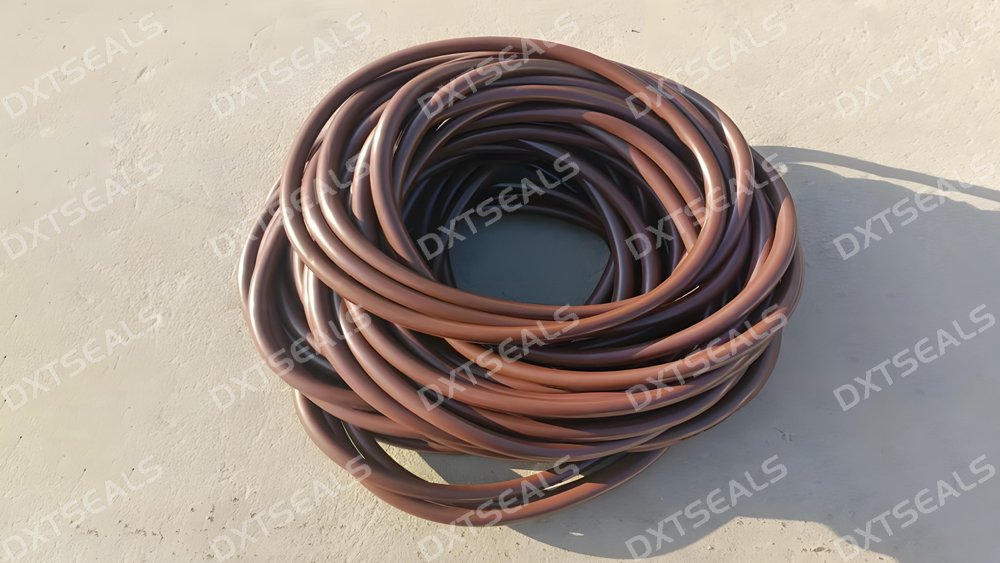
In the demanding world of industrial sealing, choosing the right material can make the difference between long-term equipment performance and frequent maintenance failures. Among the many elastomers available, FKM (Fluoroelastomer)—often known by its brand name Viton®—stands out for its exceptional resistance to heat, oil, and chemicals.
In this article, DXTSEALS breaks down the key advantages of FKM in the sealing industry and explores where and why it's the preferred material in many critical applications.
🔍 What Is FKM?
FKM (fluoroelastomer) is a class of synthetic rubber developed for high-performance applications. It contains a high proportion of fluorine atoms, which gives it unique chemical and thermal resistance properties.
It is commonly used in the form of FKM O-rings, FKM oil seals, FKM gaskets, and other custom-shaped sealing products.
✅ Key Advantages of FKM in Sealing Applications
1. Excellent Heat Resistance
FKM can operate continuously at temperatures up to 200–250°C (392–482°F), with short-term resistance even higher. This makes it ideal for engine seals, exhaust systems, and high-temperature hydraulic equipment.
2. Superior Chemical Resistance
FKM is highly resistant to a wide range of chemicals, including:
-
Mineral oils
-
Fuels (diesel, gasoline, biodiesel blends)
-
Hydraulic fluids (especially phosphate ester-based)
-
Acids, solvents, and oxidizers
This makes it suitable for chemical processing, fuel systems, and industrial pumps.
3. Outstanding Oil and Fuel Resistance
Unlike many rubbers, FKM retains its strength and flexibility after long-term exposure to oils, fuels, and lubricants, ensuring long-lasting performance in automotive and industrial applications.
4. Low Compression Set
FKM seals retain their shape over time, reducing the risk of leakage due to seal deformation—a common failure mode in dynamic and static sealing environments.
5. Weather and UV Resistance
FKM withstands ozone, UV rays, and weathering, making it reliable for outdoor sealing and long-term storage without degradation.
🧪 Application Areas of FKM Seals
FKM's premium performance makes it ideal for critical industries such as:
| Industry | Common Applications |
|---|---|
| Automotive | Engine gaskets, fuel system seals, transmission seals |
| Aerospace | Fuel lines, hydraulic systems, high-temp sealing |
| Chemical Processing | Pump seals, valve seats, gasket systems |
| Oil & Gas | Downhole tools, refinery equipment, fuel injection |
| Industrial Machinery | Hydraulic/pneumatic seals, rotating shaft seals |
| Food & Pharma (with FDA grade FKM) | High-purity seals for aggressive CIP/SIP |
📊 FKM vs. Other Elastomers
| Property | FKM | NBR | EPDM |
|---|---|---|---|
| Heat Resistance | ★★★★★ | ★★☆☆☆ | ★★★☆☆ |
| Oil Resistance | ★★★★★ | ★★★★☆ | ★☆☆☆☆ |
| Chemical Resistance | ★★★★★ | ★★☆☆☆ | ★★★☆☆ |
| Cost | $$$ | $ | $$ |
Note: FKM is more expensive but offers significantly longer lifespan in harsh environments.
🛠 Tips for Using FKM in Sealing Systems
-
Use FKM where heat + oil + chemical resistance are all required
-
Avoid FKM in low-temperature environments below –20°C (–4°F), unless low-temp FKM grades are used
-
Always verify compound compatibility with your specific medium
-
Consider custom molded FKM seals for high-performance or irregular components
🏁 Conclusion
FKM is a high-end sealing material with excellent resistance to extreme conditions. Although it comes at a higher cost, the performance benefits and extended service life it offers often make it the most cost-effective choice in the long run.
At DXTSEALS, we offer a wide range of standard and custom FKM sealing products, engineered for challenging industrial environments.
👉 Contact DXTSEALS today to request a sample or get expert advice on FKM seal selection for your application.
